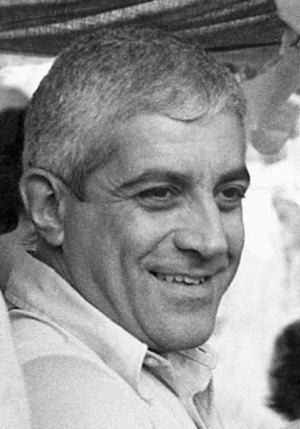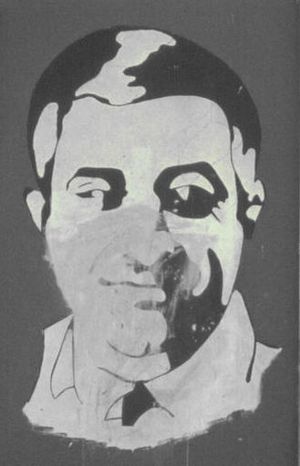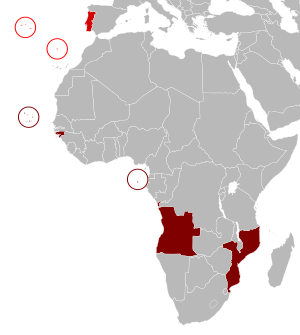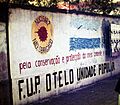Otelo Saraiva de Carvalho facts for kids
Quick facts for kids
Otelo Saraiva de Carvalho
MSMM • GCL • MPCE
|
|
|---|---|

Otelo Saraiva de Carvalho in 1976
|
|
| Nickname(s) | Otelo |
| Born | 31 August 1936 Lourenço Marques, Mozambique, Portugal |
| Died | 25 July 2021 (aged 84) Lisbon, Portugal |
| Allegiance | |
| Service/ |
|
| Years of service | 1955–1984 |
| Rank | Colonel |
| Battles/wars | Portuguese Colonial War
|
| Awards | Grand Cross of the Order of Liberty |
| Other work | Candidate for President of Portugal |
Otelo Nuno Romão Saraiva de Carvalho (born August 31, 1936 – died July 25, 2021) was a Portuguese military officer. He was a key leader in the Carnation Revolution of 1974 in Lisbon. This event changed Portugal from a dictatorship to a democracy.
After the Revolution, Otelo took on important roles in the first Portuguese governments. He also led a special military force called COPCON. In 1976, Otelo ran for president in Portugal's first free election. He came in second, with many people from the far-left supporting him. Later, he was involved with a group that used violence to try and change the new democracy. He was tried and sentenced for his role in this group. However, in 1996, the Portuguese Parliament decided to pardon him and others involved. This pardon was a way to help the country heal and move forward.
Contents
Early Life and Military Career
Otelo Saraiva de Carvalho was born in Lourenço Marques, which was then part of Portuguese Mozambique. This was on August 31, 1936. His family had roots in both Portugal and Goa, a former Portuguese territory in India. His parents named him after the famous character Othello from Shakespeare's play.
He finished school in Lourenço Marques. His father worked for the government, and his mother was a railway clerk. In 1955, when he was 19, Otelo joined the Military Academy in Lisbon.
Otelo spent many years fighting in the Portuguese Colonial War in Africa. He served in Portuguese Angola from 1961 to 1963 as a second lieutenant. He was a captain in Angola from 1965 to 1967. In 1970, he went to Portuguese Guinea as a captain. There, he worked under General António de Spínola, focusing on civilian matters and public relations.
On November 5, 1960, he married Maria Dina Afonso Alambre. They had two daughters and a son.
The Carnation Revolution
Otelo joined a secret group of soldiers called the Movement of Armed Forces (MFA). This group carried out a coup d'état (a sudden takeover of the government) in Lisbon on April 25, 1974. Otelo played a very important role in planning and leading this event, which became known as the Carnation Revolution. This revolution ended Portugal's long-standing dictatorship without much bloodshed.
In July 1974, Otelo was promoted to brigadier. He was put in charge of a special military group called COPCON. This group was created to keep order in the country and help the new revolutionary changes happen. In 1975, there was a lot of disagreement within the MFA. Otelo represented the more left-wing side of the movement.
After the revolution, there was tension between different political groups, especially between communist and non-communist forces. The MFA itself was becoming more left-leaning.
A right-wing attempt to take power, led by António de Spínola, was stopped by COPCON in March 1975. Otelo then became part of the Council of the Revolution, which was formed on March 14, 1975. In May 1975, he was temporarily promoted to general. He, along with Francisco da Costa Gomes and Vasco Gonçalves, formed a special leadership group called the Directório.
In July 1975, Otelo visited Cuba with other Portuguese military officers. He met with Fidel Castro, Cuba's leader. During this trip, Castro told Otelo about his plan to send Cuban troops to Angola. Otelo assured Castro that Portugal would not object to Cuba's involvement there.
The period between March 11 and November 25, 1975, was called the "Hot Summer of 1975". This was a time of many clashes and power struggles between different political groups.
As the head of COPCON, Otelo made some controversial decisions. For example, he signed arrest warrants without the usual court process. This led to people being detained, sometimes without knowing why.
On November 25, 1975, a coup attempt by extreme left-wing groups took place. Members of the MFA, the Portuguese Army Commandos, and COPCON were involved. Otelo helped plan this coup. However, it failed to take control of the government. Because of this failure, Otelo was put in prison for three months. António Ramalho Eanes then rose to power, and COPCON was disbanded.
Presidential Campaigns
In 1976, Otelo ran for president against Eanes. He campaigned on ideas of socialism, national independence, and giving more power to the people. Many working-class people, especially in Setúbal and Alentejo, supported him. A famous Portuguese songwriter, Zeca Afonso, also supported his campaign. Otelo came in second place in the election, receiving 16.46% of the votes. António Ramalho Eanes was elected president.
After this election, Otelo was active in creating the GDUP (Popular Unity Stimulating Groups). These groups were similar to ones Otelo had seen in Cuba. They grew across the country, with many members supporting the idea of using armed struggle for political change.
In 1980, Otelo ran for president again. He was nominated by a far-left political party he helped create, called Força de Unidade Popular (FUP). He continued to campaign on building socialism in Portugal. Again, the musician José Afonso supported him. This time, Otelo did not do as well. He finished third, with only 1.4% of the votes.
Later Life and Legacy
After his second presidential election defeat, Otelo Saraiva de Carvalho became involved with a group called the Global Project. This group aimed to change the government through armed action. It included a legal political party, the Força de Unidade Popular (FUP), and a more secretive group that used violence. This group was responsible for bombings and other attacks.
In June 1984, Otelo was arrested. He was accused of being a leader of this group. During the police operation, documents were found at his home and the FUP headquarters. These documents included notebooks written by Otelo, which detailed meetings and operations.
In October 1985, Otelo was found guilty for his role in leading the group and was sentenced to 15 years in prison. This sentence was later increased to 17 years. He appealed the decision. Since his appeals were still ongoing, he was released on May 17, 1989, after five years in prison. He was also demoted in his military rank.
Pardon and Amnesty
Because of many appeals, his sentence never became final. The President at the time, Mário Soares, wanted to protect Otelo's historical image as a hero of the Carnation Revolution. He pushed for a political solution instead of a long legal process. In 2004, the Parliament approved a pardon and an amnesty for politically motivated crimes committed during a certain period. This included the actions of the group Otelo was involved with.
Otelo retired from military service and public life in 1989. After retiring, he remained a political activist. He appeared in several documentaries about the Carnation Revolution.
In March 2020, he was hospitalized in Lisbon for heart problems. He was hospitalized again in July 2021 and died fifteen days later, on July 25, at the age of 84.
Influence
Otelo is still seen as an important figure by many left-wing activists in Portugal. However, some right-wingers dislike him. They see him as someone who tried to take power and change Portugal into a communist country.
In 2006, Otelo was voted the 68th greatest Portuguese person in a national competition called Os Grandes Portugueses.
Images for kids
See also
 In Spanish: Otelo Saraiva de Carvalho para niños
In Spanish: Otelo Saraiva de Carvalho para niños
 | Georgia Louise Harris Brown |
 | Julian Abele |
 | Norma Merrick Sklarek |
 | William Sidney Pittman |




